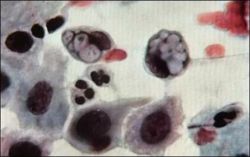A new species of bacteria discovered living in one of the most extreme environments on Earth could yield a tool in the fight against global warming.
In a paper published in Nature, University of Calgary biology professor Peter Dunfield and colleagues describe the methane-eating microorganism they found in the geothermal field known as Hell’s Gate, near the city of Rotorua in New Zealand.
It is the hardiest “methanotrophic” bacterium yet discovered, which makes it a likely candidate for use in reducing methane gas emissions from landfills, mines, industrial wastes, geothermal power plants and other sources.
“This is a really tough methane-consuming organism that lives in a much more acidic environment than any we’ve seen before,” said Dunfield, who is the lead author of the paper. “It belongs to a rather mysterious family of bacteria (called Verrucomicrobia) that are found everywhere but are very difficult to grow in the laboratory.”

Methanotrophic bacteria consume methane as their only source of energy and convert it to carbon dioxide during their digestive process. Methane (commonly known as natural gas) is 20 times more potent a greenhouse gas than carbon dioxide and is largely produced by decaying organic matter. Scientists have long known that vast amounts of methane are produced in acidic environments, not only geothermal sites but also marshes and peat bogs. Much of it is consumed by methanotrophic bacteria, which serve an important role in regulating the methane content of the world’s atmosphere.
“Scientists are interested in understanding what conditions cause these bacteria to be more or less active in the environment” says Dunfield, “Unfortunately, few species have been closely studied. We now know that there are many more out there.”
Dunfield has tentatively named the new bacterium Methylokorus infernorum to reflect the ‘hellish’ location of its discovery where it lives in boiling waters filled with chemicals that are toxic to most life forms. The Maori caretakers of the site, the Tikitere trust, have supported scientific study of the area. The study was conducted while Dunfield was working for GNS Science, a geological research institute owned by the New Zealand government. He recently joined the U of C’s Department of Biological Sciences as a professor of environmental microbiology.
The bacterium’s genome has been completely sequenced by researchers at the University of Hawaii and Nankai University in China, which could help develop biotechnological applications for this organism.
Dunfield said he plans to pursue his work in Canada by hunting for new life forms in extreme environments such as northern peatlands, the oilsands of northern Alberta and the hot springs of Western Canada.
“Hot springs are exotic and extreme habitats, where you find a lot of bizarre organisms,” he said. “Bacteria are a fascinating group to work with because 95 per cent of them have never been studied in a lab and we have very little idea about what this huge amount of biodiversity is capable of.”
Dunfield’s Nature article was published online on November 14, 2007 and in the December 6 edition of the journal.